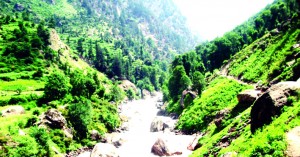Girgan
This is a collection of articles archived for the excellence of their content. |
The valley of natural lakes
Dr R D Gupta , Girgan: The valley of natural lakes "Daily Excelsior" 23/4/2017
The Girgan valley, falls in Poonch district and is situated about 60 km from Poonch town. This valley starts from the top of Bharamgala (Chai) mountain and goes upto Raviwali Dhok (a kind of grassland) which touches the last corner of Budhal, a tehsil of Rajouri district.
The Girgan valley is the coldest zone of the Pir Panjal (Panchal) range of the Himalayas as this valley remains under snow cover for more than five months during winter season. Infact this valley, sprawling over an area of 714 square kolometer (42 km long and 17 km breadth), is fully characterized by lofty snow-capped peaks and a number of glaciers. These, as a result, create a large number of attractive gushing streams as well as other aquatic bodics.
The presence of lush green pastures, locally known as Dhoke and Margs, and growing of multicoloured flowers are the other distinguishing characterestics of the Girgan valley. Owing to the occurrence of velvet pastures, Girgan valley is considered to be an abode of nomadic tribes Bakarwals, Gujjars and Pahari migratory population. These nomadic tribes start pouring in the Dhokes and Margs of this valley in the beginning of spring season along with their cattle, flock of sheep, goats and horses and after passing about six months in this cold region, return to their native villages during September. The important Dhokes and Margs of this valley are: Girgan, Gali Girgan, Panjtari, Khulan, Chai, Hussain, Thumb, Kuthwali, Bagnuwali, Godrianwali, Kafarkatha, Raviwali, Bayarwali and Kasgallana.
Apart from these Dhokes, Margs and pasture lands, there are about 27 lakes in this valley but renowned lakes are seven in number.
Legend of the seven lakes
As per the legend, in the ancient times there was a king known as Girgan Dev, who was ruling this tract. Girgan Dev was spiritually endowed king having six sons and one daughter. The name of his sons and daughter were- Nandan, Chandan, Neel, Sukh, Bhag, Gum and Kali (daughter). During his old days, King Girgan Dev decided to leave kingship and go to the forest for worshipping of the Almighty. With this idea, he directed his sons and daughter to go on to Pir Panjal mountain range to select the place where he could worship God for his remaining life. On this order, all his sons and daughter left for scarching a peaceful place for their father to worship. After selecting the sites everybody, except Gum, returned and reported to their father. Girgan with his five sons and daughter went in search of Gum, who had not come. When they arrived at Gumsar of present time, they saw Gum sitting at a beautiful site. Gum stated to his father that he would not vacate this place as he himself would stay there. By this way, Gum confronted his father.
At that moment, the King Girgan Dev became very angry and he embedded his son Gum in the earth with his divine power and told him that he would never come out on the surface and people would not even know his name. Thereafter, King Girgan Dev accompanied by his other five sons and daughter visited the sites selected by them for his worship. After visiting these sites, their father was very happy and pleased. He told them that after their demise all of them will be turned into beautiful lakes. By this way, all of them will dwell on the mother earth forever in the form of lakes. Thus, after the name of his sons and daughter i.e Nandansar, Chandansar, Sukhsar, Kotarsar, Bhagsar, Neelsar and Akalidakshni lakes came into existence. Therefore, the valley of seven lakes is known as Girgan valley after the name of the king Girgan Dev.
Out of these seven lakes, Kotarsar is the smallest lake but commands a scientific look. Kotarsar is also the source of Poonch river, the water of which constitutes the lifeline of many villages. Nandansar is about 4 km in length and near 1.6 km in breadth. The water of this lake flows towards Alibad Sarai, which is situated in Kashmir valley, while as the water of all other lakes flows towards Poonch district in the form of Parnal nallah and Chitta Pani nallah.
Suggestions for the future
Although the Girgan valley is still remote in reach yet has all the aspects that a great valley can boast of.Hence, the State Tourism Department must give due attention to explore its tremendous tourist potential. For this purpose, the following priorities required to be exhorted:
- Since at present the valley of seven lakes is not well connected with road, except three bridle paths- Noorichamb-Husathum-Panjtari-Nandansar, Behramgala-Chaigali-Girgan-Khuian-Nandansar and Dehra Ki Gali-Rattan Pirkuthgali-Girgan Nandansar, so there is dire need of construction of various link roads.
- There is also a need of development of pony paths, viewing decks, shelter sheds, rest houses and guest houses.
- Rest houses and guest houses should be built at Noorichamb, Panjari and Girgan for the convenience of the tourists, trackers and climbers.
(The author is former Associate Dean-cum-Chief Scientist KVK SKUAST-J)
